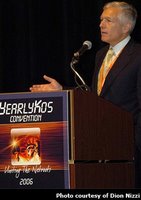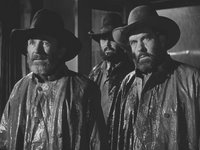The Top Three Contenders Tossed from Tour de France
Ivan Basso, Jan Ullrich and Francisco Mancebo, who finished second, third and fourth behind Lance Armstrong last year are all out after being implicated in a doping investigation. Reuters has the story:
The doping scandal erupted last month after the Spanish Civil Guard raided a number of addresses to find large quantities of anabolic steroids, laboratory equipment used for blood transfusions and more than 100 packs of frozen blood.OLN commentator Phil Liggett points out that the three top riders are out based on a decision on the part of all 21 teams that no rider implicated in the investigation wouldn't race:
Earlier on Friday, ASO announced it was in possession of a list of more than 50 riders involved in the probe after being handed a 37-page document by the Spanish Cycling Federation.
Guilty by implication rather than any solid proof, the three riders have all denied any association with the drugs bust five weeks ago which was known to Spanish police as Operacion Puerto. There names appear on an official list sent to the Tour organizers late on Wednesday.International cycling may the most closely policed sport on the planet. (Imagine Major League Baseball agreeing to bench any player implicated in steroid use.) In the Tour de France, every daily stage winner is required to provide a sample. (Imagine Barry Bonds being tested after every home run.) As for the stringency of the testing, the test for EPO doesn't detect the substance itself but relies on subtle analysis of the rider's red blood cell count. Despite the seemingly endless speculation, Lance Armstrong can fairly claim to be the most tested athlete in the history of sports.
...
Tour de France organizers called a meeting yesterday morning with all 21 teams taking part and as a result earned a unanimous decision from the team managers that any name on the list would be withdrawn from the team without a replacement possible.
So who's left?
The top U.S. riders are considered to Floyd Landis (Phonak), Levi Leipheimer (Gerolsteiner) and George Hincapie (Discovery Channel) who rode with Lance Armstrong on every one of his seven victories.
Yaroslav Popovych and Paolo Salvodelli, also of Discovery Channel, are considered genuine contenders as well. The team is giving all three the green light to compete in the general classification until one of them clearly establishes himself as the team leader.
Alexandre Vinokourov (Wurth), Alejandro Valverde (Caisse d'Epargne-Illes Balears) and Cadel Evans (Davitamon-Lotto) are also considered contenders.
The race covers 2,267 miles in 20 stages over three weeks.













